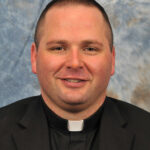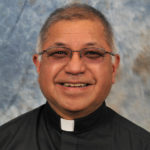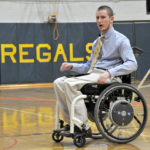People forced to flee from their homes in northeastern Syria because of the abrupt pullout of U.S. troops need many things, among them psychosocial support and protection services. That report comes from the UNHCR, the UN Refugee Agency that estimates some 166,000 people fled from their homes last week following the pullout.
Northeastern Syria had been a peaceful pocket in the war-torn country, but no longer. Turkey took the pullout as a cue to send military troops into the region to take control of the border from Kurdish fighters and to achieve economic (oil and natural gas), political and racial objectives.
A hastily agreed-to cease-fire, which expired after The Catholic Messenger went to press this week, cannot reverse the damage already done. Children and adults, caught in the crossfire, have died or been seriously injured. The U.N. is looking into reports that Turkey used chemical weapons in its offensive.
Use of chemical weapons violates an international ban in effect since World War I and reinforced in 1972 and 1993 (International Committee of the Red Cross).
Children and adults have arrived at a hospital in the region with unusual burns of varying severity, says human rights activist Widad Akreyi. A colleague at the hospital and his team reported treating children and adults for burns “they haven’t seen before.”
The list of consequences of our country’s arbitrary pullout grows longer. The Kurdish fighters we supported in their successful efforts to rid the region of ISIS terrorists have been thrown into the lion’s den. Turkey could release thousands of ISIS terrorists imprisoned in the region, resulting in the unleashing of another reign of terror.
“ISIS barbaric attacks in Northern Iraq in 2014 were implemented by about 1,000 ISIS militants. Imagine the barbarism that would result in unleashing the viciousness of thousands of them,” said Akreyi, who received the Pacem in Terris Peace and Freedom Award from Bishop Thomas Zinkula two years ago for her steadfast commitment to human rights advocacy.
And what of those 166,000-plus displaced children, women and men? Where will they spend their days and nights as winter approaches? “They need peace and every basic human need. They have nowhere to go because this was the most peaceful part of Syria, the only part where people could enjoy a little sense of normality in the madness that is called the Syrian crisis,” Akreyi said.
She offers recommendations to alleviate if not resolve this crisis:
• The U.S. should not only maintain but also strengthen its presence in northeastern Syria. The collaboration between the U.S. and Kurds brought peace to that region and saved many lives. Collaboration works.
• U.S. leaders should also use diplomacy inside the United Nations Security Council to force Turkey to withdraw from northeastern Syria. Turkey must be required to retreat to its side of the border and to end its invasion and occupation of the region, including Afrin province, which Turkey invaded in 2018 and still occupies. Turkey must be required to make reparations to the families of victims and to the survivors for the destruction and injuries they have endured.
• As individuals, and as communities, we can call or send emails to our members of Congress (www.contactingcongress.org) to express our expectations that they will take immediate action to stand with the people of northeastern Syria and reverse the decision of abandoning their allies. Politicians will listen to their constituents.
• Contact U.S. aid organizations, such as Catholic Relief Services (www.crs.org) and ask them to increase their focus on northeastern Syria. Coordination is essential.
• Remember the power of prayer. “Please have us in your prayers. We need them like never before.”
Our Vision 20/20 initiative in the Diocese of Davenport envisions Catholics reaching out to and accompanying others wherever they may be. Northeastern Syria needs US.
So let us reach out in prayer and advocacy. Human lives are at stake.
Barb Arland-Fye, Editor
(arland-fye@davenportdiocese.org)











